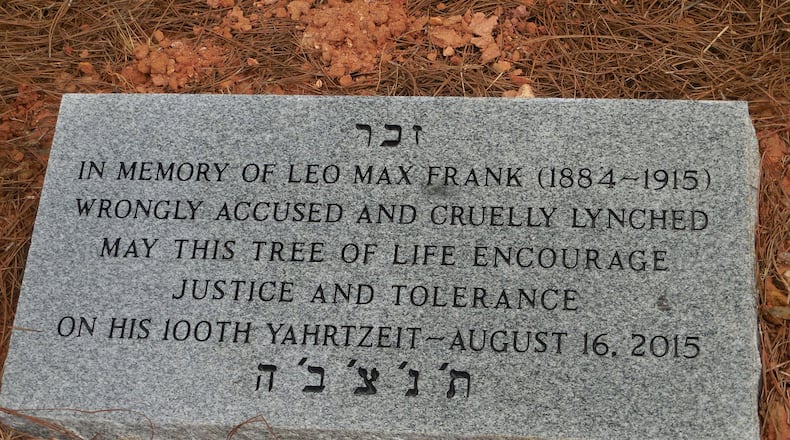Neither longtime Marietta City Councilman Philip Goldstein nor former State Sen. Chuck Clay recall hearing about the lynching of Leo Frank until they were adults, long after the horror of 100 years ago had touched both of their families indelibly.
Frank, a Jewish factory superintendent, was lynched at daybreak on Aug. 17, 1915 near where Interstate 75 crosses Roswell Road in Cobb County. He had been convicted of 13-year-old factory worker Mary Phagan’s 1913 murder on circumstantial evidence despite evidence pointing to another suspect, following a shoddy investigation and amid a sea of anti-Semitic rhetoric. After a thorough review by the governor, Frank had his death sentence commuted, only to be seized by a well-organized cabal from Marietta.
» VIEW OUR SPECIAL INTERACTIVE REPORT: ‘Georgia’s shame’: Frank case still resonates
After the hanging, for which no one was ever charged, crowds surged onto the Marietta Square to celebrate. Goldstein’s grandfather ran a store on the square, where ominous handbills had warned Jewish merchants to clear out.
“My grandfather gathered up the family, closed up the store and pushed through the crowd toward the trolley,” Goldstein said Sunday during a service to memorialize Frank at Congregation Etz Chaim in East Cobb, about six miles east of where Frank died. “The mob followed them to the trolley car. Once they reached the trolley car and boarded the mob went violent and shook the trolley car. For my nine-year-old uncle and my seven-year-old aunt, they were flat-out terrified.”
Clay’s grandfather’s brother, Herbert Clay, who died in 1923, was on the other side of the issue. A past mayor of Marietta, he was identified in Steve Oney’s authoritative book about the case, “And the Dead Shall Rise,” as one of the conspirators. Decades later Chuck Clay helped connect the author with Herbert Clay’s son, now also deceased, to assist with his research.
“We can’t ever, ever, ever forget,” said Clay, who also spoke at the Congregation Etz Chaim event, which included a commemorative tree planting with dirt from the lynching site.
It was one of several gatherings held to mark today’s grim centennial. Also on Sunday, Historic Oakland Cemetery guides gave tours of its Jewish section (Frank is buried in New York) and the Southern Museum of Civil War and Locomotive History in Kennesaw held a preview reception for “Seeking Justice: The Leo Frank Case Revisited,” an exhibition of artifacts and photography on display today through Nov. 29.
Presented in partnership with the William Breman Jewish Heritage Museum and the Museum of History and Holocaust Education, the exhibition was conceived of and researched by Jane Leavey, founding executive director of the Breman (now retired) and by the Breman’s archivist, Sandy Berman, who was also responsible for tracking down most of the original artifacts on display.
On Thursday, a standing-room only crowd packed the Strand Theatre on the Marietta Square for a discussion with Oney and Stan Deaton, senior historian at the Georgia Historical Society.
“One hundred years ago, a stone’s throw from where we are gathered, the best men of Marietta were putting the final touches on a bold and damnable plot,” Oney said. “These men came from Marietta’s finest families. Their ghosts are here tonight. Also here is Mary Phagan, the 13-year-old child laborer whose murder Marietta sought to avenge.”
Key to Frank’s conviction was testimony by factory janitor Jim Conley, who testified that he helped Frank dispose of Phagan’s body. In 1982, 83-year-old Alonzo Mann, an office boy at the time of the murder, revealed he’d seen Conley carrying Mary Phagan’s body to the basement the day of her death but said he’d kept silent because Conley had threatened to kill him if he spoke up. Oney first wrote about the case for Esquire magazine after Mann, now deceased, came forward.
“Marietta, not surprisingly, has had a difficult relationship with Leo Frank but Leo Frank will forever be a resident of Marietta,” Oney said. “His ghost is here, too.”
Sunday’s events included a service at Temple Kol Emeth in East Cobb, where Rabbi Steve Lebow has been leading the charge to have Frank, who was posthumously pardoned in 1986, declared fully exonerated. Speakers included former Georgia Supreme Court Chief Justices Leah Ward Sears and Norman S. Fletcher, Cobb County Superior Court Chief Judge J. Stephen Schuster and Senior Assistant Attorney General and former Marietta City Councilman Van Pearlberg. Attorney and Emory law professor Dale Schwartz, who in his role with the Southeastern Region of the Anti-Defamation League was key in securing Frank’s pardon, spoke at both Temple Kol Emeth and Congregation Etz Chaim.
“It’s important we keep this story alive,” Schwartz said. “We have to be mindful of the twin evils of prejudice and bigotry.”
About the Author
Keep Reading
The Latest
Featured




